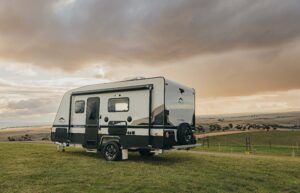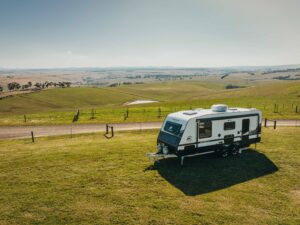When shopping for a caravan, it’s important to consider not just the features and amenities that the caravan offers, but also the source of materials it is made from and the impact that has on the environment as well as how energy efficient it is throughout its life.
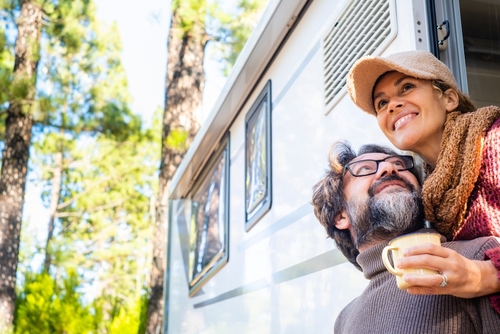
Caravans that are manufactured using environmentally responsible best practices & principles can help reduce your carbon footprint and contribute to a more sustainable future.
One reason to search for caravans made with environmentally responsible best practices is that they often use materials that are more sustainable, durable, and eco-friendly. For example, some manufacturers use timber-frame panels in the construction of their caravan walls & ceiling and depending on where the materials are sourced this may have a negative impact on the environment through deforestation & displacement or destruction of natural biodiversity. Using timber framing in caravans can be less durable when camping out off the grid or touring through harsh Australian landscapes as this material choice is more susceptible to warping, rotting or even bug infestation, especially in tropical environments.
At Green RV our preferred material choice for caravan construction is aluminum & composite materials.
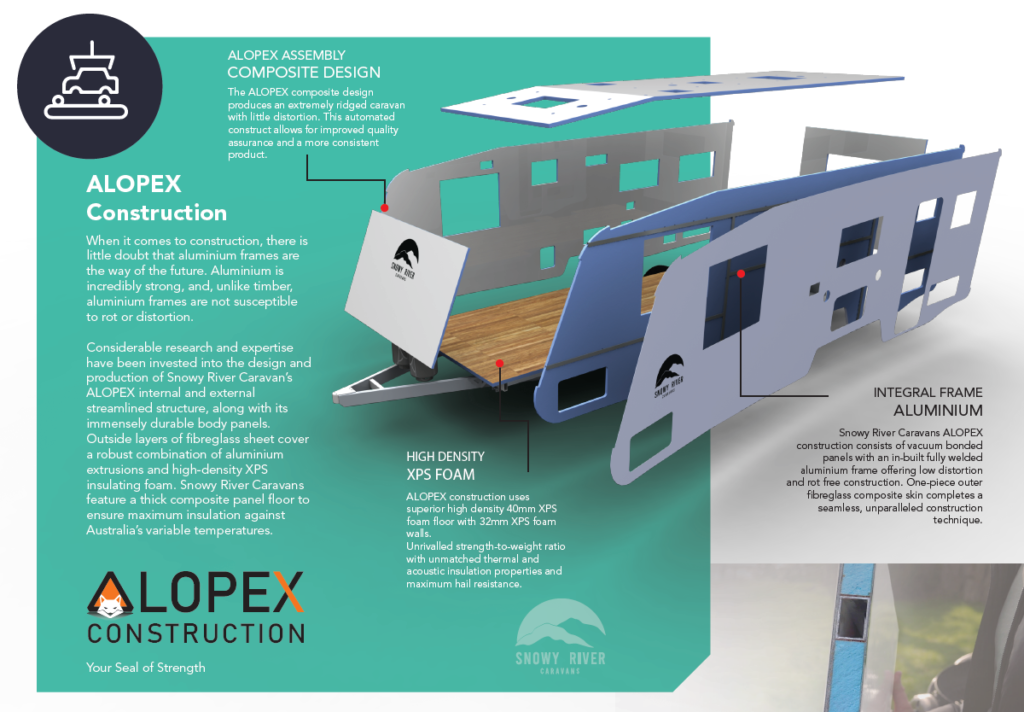
Aluminum is ranked highly as an environmentally friendly material when compared to other materials. Here are a few reasons why aluminum can be considered environmentally friendly:
- Energy efficiency: Aluminum production requires less energy than the production of many other materials, including steel. This means that the production of aluminum has a lower carbon footprint.
- Recyclability: Aluminum is one of the most recyclable materials, and it can be recycled indefinitely without losing its quality. This means that recycled aluminum can be used to make new products, reducing the need for new raw materials and conserving resources.
- Durability: Aluminum products are often long-lasting, which means that they can be used for many years before needing to be replaced. This can reduce waste and the environmental impact of product disposal.
- Lightweight: Aluminum is a lightweight material, which means that products made from aluminum often require less energy to transport, further reducing their environmental impact.
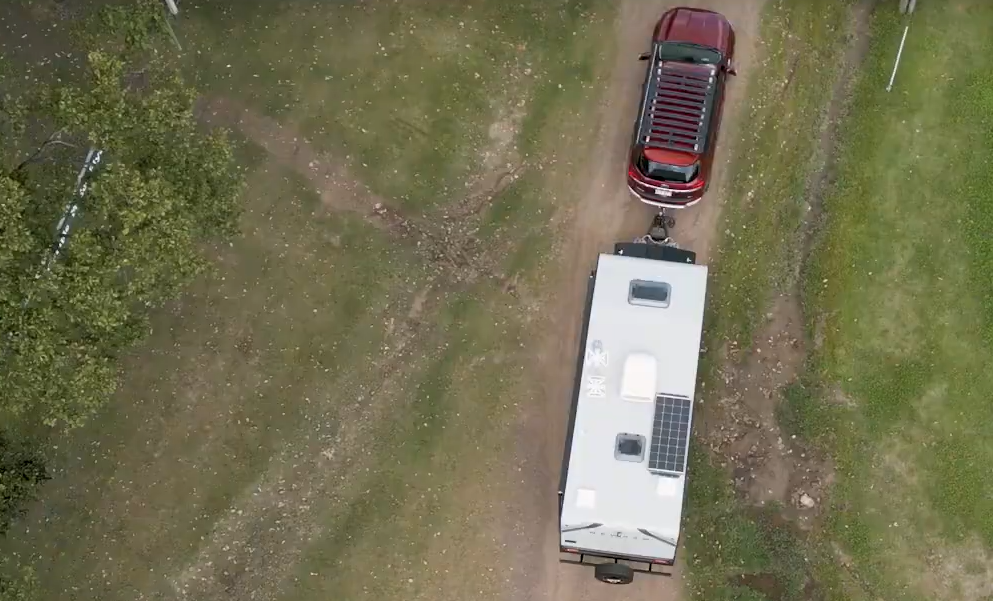
Another reason to look for environmentally responsible caravan design is they often have features and technology that help reduce energy consumption and carbon emissions.
For example, some caravans may be equipped with solar panels or other renewable energy sources, such as deep cycle AGM batteries or Lithium Batteries, which can help reduce the need for fossil fuels and lower your carbon footprint. Others may have energy-efficient appliances or thicker insulation, which can help reduce your energy use and save you money on utilities.
There are several appliances and accessories that can help make your caravan more energy efficient and sustainable when camping out or living off grid:
- Solar panels: Solar panels are a great way to generate your own electricity while living off the grid. Look for panels with a high-efficiency rating to maximize your energy production.
- Energy-efficient appliances: Choose appliances with high energy-efficiency ratings, such as LED light bulbs, low-energy refrigerators, and Energy Star-certified appliances. These will help reduce your energy consumption and save you money on utilities.
- Water heater: A gas water heater can help reduce your energy consumption and reliance on fossil fuels. Alternatively, you could consider a solar water-heated outdoor shower, which is also a more sustainable option.
- Composting toilet: If you are staying somewhere long term, A composting toilet can help reduce your water usage and create a more sustainable sewage solution.
- Gray water system: A gray water catchment system can help you recycle and reuse your wastewater, reducing your water usage and conserving resources.
- Rainwater collection system: A rainwater collection system can help you capture and store rainwater for use in your caravan, reducing your reliance on municipal water supplies.
- Energy-efficient window design: Look for windows that are tinted to reduce heat radiating indoors on those hot summer days, also be sure to look for windows that can open up to catch the breeze for ventilation helping cool the interior without using air-conditioning systems. Make sure windows have insect-proof screens too so you don’t need to spray chemicals.
- Energy-efficient heating and cooling: Look for heating and cooling appliances that are energy efficient, such as diesel heaters or mini-split systems air conditioners.

Overall, understanding and searching for caravans that are manufactured using environmentally responsible & sustainable best practices can help you make a more eco-friendly choice when shopping for a caravan. Not only will this help reduce your carbon footprint and contribute to a more sustainable future, but it can also potentially save you money on utilities & maintenance costs.

Now you need to find the perfect place to park your new home!
When searching for land for an off-grid setup, it’s important to consider the availability of water, solar exposure, fertility of the soil, proximity to resources, and climate of the area. Here are some key points to consider.
- Access to water: When searching for land for an off-grid homestead, it’s important to consider the availability of water. Look for land with a reliable source of water, such as a well or stream, or land that is suitable for rainwater catchment.
- Solar exposure: Solar energy is a key consideration for an off-grid homestead, so look for land with good solar exposure. This will help ensure that you have enough solar energy to power your home and appliances.
- Fertility of the soil: If you plan to grow your own food, it’s important to consider the fertility of the soil on the land you’re considering. Look for land with soil that is rich in nutrients and suitable for growing a variety of crops.
- Proximity to resources: Consider the proximity of the land to resources such as grocery stores, medical facilities, and other amenities. This can be especially important if you’re planning to live off the grid full-time.
- Climate: Think about the climate of the area you’re considering. Some climates may be more suitable for off-grid living than others, depending on your needs and preferences.
At Green RV, we believe that it’s important to make choices that are good for the environment as well as for our customers. That’s why we are proud to offer a range of caravans that are manufactured using environmentally responsible best practices.
When you purchase a caravan from us, you can feel good knowing that you are supporting a company that values sustainability. Our caravans are made with eco-friendly materials and feature energy-saving technologies that help reduce your carbon footprint.
So why wait? Join the growing community of eco-conscious travelers and invest in a caravan from Green RV today. You’ll be making a choice that’s good for you and the planet.

